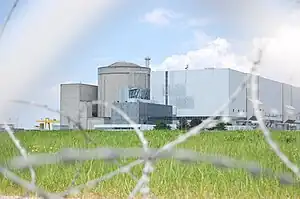| Blayais Nuclear Power Plant | |
|---|---|
 | |
| Official name | Centrale nucléaire du Blayais |
| Country | France |
| Location | Blaye, Gironde, Nouvelle-Aquitaine |
| Coordinates | 45°15′21″N 0°41′35″W / 45.25583°N 0.69306°W |
| Status | Operational |
| Construction began | Units 1–2: 1 January 1977 Units 3–4: 1 April 1978 |
| Commission date | Unit 1: 1 December 1981 Unit 2: 1 February 1983 Unit 3: 14 November 1983 Unit 4: 1 October 1983 |
| Owner(s) | EDF |
| Operator(s) | EDF |
| Nuclear power station | |
| Reactor type | PWR |
| Reactor supplier | Framatome |
| Cooling source | Gironde estuary |
| Thermal capacity | 4 × 2785 MWth |
| Power generation | |
| Units operational | 4 × 910 MW |
| Make and model | CP1 |
| Nameplate capacity | 3640 MW |
| Capacity factor | 82.73% (2017) 75.15% (lifetime) |
| Annual net output | 26,380 GWh (2017) |
| External links | |
| Website | Centrale nucléaire du Blayais |
| Commons | Related media on Commons |


The Blayais Nuclear Power Plant is a nuclear plant on the banks of the Gironde estuary near Blaye, France operated by Électricité de France.
Description
The power plant has 4 pressurized water reactors – producing 951 MW gross and 910 MW net each.[1] They were commissioned from 1981 to 1983. The plant has 1200 EDF employees and 350 permanent workers.
The four reactors produce about 25 TWh per year[1] which is about 5% of the total electricity consumption in France (2015: 476 TWh).[2] Since its commissioning, the Blayais nuclear power plant has produced more than 800 TWh,[1] nearly twice the equivalent of the French electricity production in one year.
In its 2016 annual report,[3] the Nuclear Safety Authority (ASN) finds that "the nuclear safety and environmental protection performance of the Blayais NPP on the whole matches ASN's general assessment of EDF and that it's radiation protection performance stands out positively", but asked for "more effective management of the nuclear waste produced during reactor outages".
Selected incidents
1999 flooding
On the evening of 27 December 1999, a combination of the incoming tide and high winds overwhelmed the sea walls at the plant and causing parts of the plant to be flooded.[4] The event resulted in the loss of the plant's off-site power supply and knocked out several safety-related backup systems, resulting in a 'level 2' event on the International Nuclear Event Scale.[5]
At the time, units 1, 2 and 4 were at full power, while unit 3 was shut down for refuelling.[4] The operation of units 1 and 2 were affected by flood damage to a number of water pumps and distribution panels, all four units lost their 225 kV power supplies, while units 2 and 4 also lost their 400 kV power supplies.[4] Diesel backup generators were employed to maintain power to plants 2 and 4 until the 400 kV supply was restored.[4] Over the following days an estimated 90,000 m3 (3,200,000 cu ft) of water was pumped out of the flooded buildings.[4]
On 5 January, the regional newspaper Sud-Ouest ran the following headline without being contradicted: "Very close to a major accident", explaining that a catastrophe had been narrowly avoided.[6]
The flooding resulted in fundamental changes to the evaluation of flood risk at nuclear power plants, and in the precautions taken.[7]
In Germany the flooding prompted the Federal Ministry for Environment, Nature Conservation and Nuclear Safety to order an evaluation of the German nuclear power plants.[4]
Opposition

The continued operation of the Blayais plant is opposed by the local anti-nuclear group 'TchernoBlaye' (a portmanteau of the French spelling of Chernobyl and Blaye, the nearest town), formed by Stéphane Lhomme on 15 December 1999.[8]
References
- 1 2 3 "IAEA PRIS Power Reactor Information System - France". Retrieved 30 September 2017.
- ↑ "2015 Annual Electricity Report" (PDF). RTE, the French transmission system operator. Retrieved 30 September 2017.
- ↑ "2016 ASN Annual Report". ASN - Autorité de Sûreté Nucléaire. Retrieved 30 September 2017.
- 1 2 3 4 5 6 Generic Results and Conclusions of Re-evaluating the Flooding in French and German Nuclear Power Plants Archived 6 October 2011 at the Wayback Machine J. M. Mattéi, E. Vial, V. Rebour, H. Liemersdorf, M. Türschmann, Eurosafe Forum 2001, published 2001, accessed 21 March 2011
- ↑ COMMUNIQUE N°7 - INCIDENT SUR LE SITE DU BLAYAIS Archived 27 May 2013 at the Wayback Machine ASN, published 1999-12-30, accessed 2011-03-22
- ↑ Sud-Ouest, 5 janvier 2000 - Centrale de Blaye : Très près de l'accident majeur
- ↑ Lessons Learned from 1999 Blayais Flood: Overview of the EDF Flood Risk Management Plan, Eric de Fraguier, EDF, published 2010-03-11, accessed 22 March 2011
- ↑ L'histoire de TchernoBlaye TchernoBlaye, accessed 29 March 2011